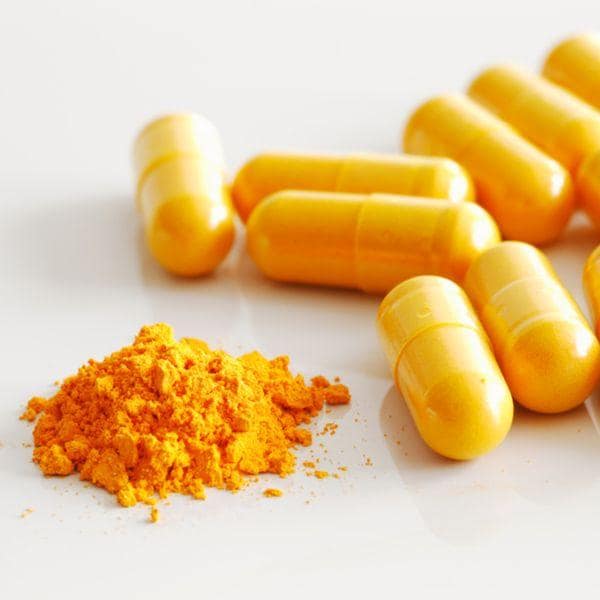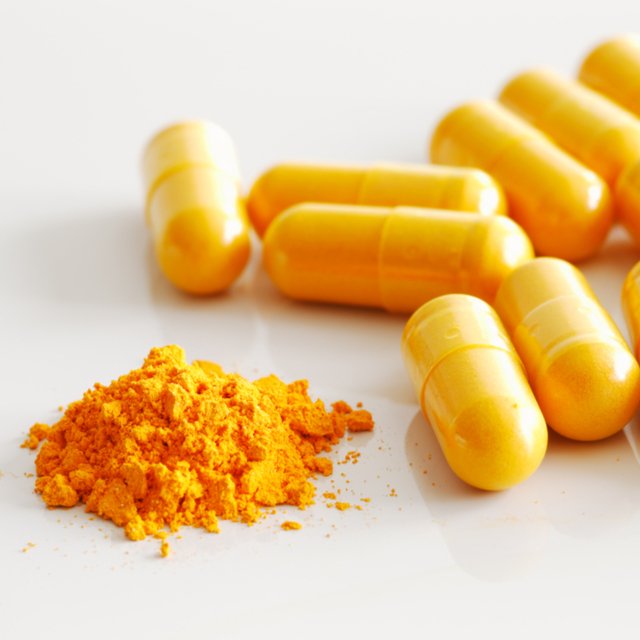What is the Ideal Turmeric Dosage for Health Benefits?
Turmeric and its well-researched antioxidant components, curcuminoids, have many beneficial uses–from supporting memory, mood and attention to promoting digestive and skin health.1,2 The roots of this ancient plant, scientifically known as Curcuma longa, have been used as a spice, health tonic and food dye for ages. And now many of us are getting the benefits of turmeric and curcumin from supplements, skin creams and even our turmeric lattes. Turmeric is everywhere! But is it possible to have too much of a good thing? And what’s the best way to take turmeric?
How to Take Turmeric
The traditional way to take turmeric is, of course, using it as a spice in your food and beverage recipes. You can also take turmeric as a supplement, or opt for a curcumin supplement instead. There are some advantages to both turmeric and curcumin.
Turmeric vs. Curcumin Supplements
Turmeric powders and supplements offer a whole-foods approach, retaining more of the root’s nutrients as nature intended. Curcumin supplements are made up of an isolated form of turmeric’s most active antioxidant, and if you want the highest-powered, most bioavailable form of curcumin, Theracurmin® is an excellent option. You can read more about the differences between turmeric and curcumin supplements in the post Turmeric vs. Curcumin: What is the Difference?
Increasing Absorption of Turmeric and Curcumin
One important thing to consider when taking turmeric or curcumin in any form is that it is not easily absorbed by the body on its own. Turmeric is fat-soluble, meaning it won’t be absorbed as well without the presence of fat or oil.3 A compound in black pepper, piperine, may also increase the absorption of turmeric.3 So, traditional preparations of turmeric in food recipes combined with fats and black pepper are a great idea, but you can also take your supplements with a meal or take it alongside an oil-based supplement like an omega-3 essential fatty acid supplement.
Turmeric Bioavailability
The curcumin in turmeric has earned a reputation for poor bioavailability in its standard form, which is attributed to poor absorption, biodistribution and metabolism.4 But, thanks to a few everyday ingredients and some technological advancements, absorption can be improved.4
Bioavailability of your turmeric supplements may be improved by encapsulating turmeric with natural, lipid-based absorption-enhancers or by combining turmeric with other natural substances, including black pepper or fats, which may increase its bioavailability.4 It can also be improved by simply taking your turmeric supplements with a meal that contains some fat and black pepper. Since curcumin is fat-soluble instead of water-soluble, oils and fats in your meals can help.
Why Does Black Pepper Help Absorption?
A major component within pepper known as piperine may increase the bioavailability of curcumin by as much as 2,000%.4 And one form of piperine, known as BioPerine®, may be particularly beneficial for enhancing absorption of curcumin. BioPerine®, a standardized black pepper extract (Piper nigrum), is the only product from piperine to obtain a patented status for its ability to increase the bioavailability of nutritional compounds. It is also the only source from piperine to have undergone clinical studies in the US to substantiate its safety and effectiveness. BioPerine® is available as a supplement, as well as in some turmeric and curcumin formulations.
Check out Discover Which Turmeric is Right for You to learn about more amazing turmeric pairings.
Why Do People Take Turmeric and Curcumin?
Turmeric for Bowel Disturbances
Turmeric may help relieve your stomach after eating something fatty or spicy.5 It can also help with gas, support digestion and calm abnormal muscle movements resulting from digestive issues.5 And it might help you rehydrated after a bout of diarrhea because it contains potassium and magnesium.5
Turmeric as a Digestive Aid
Turmeric contains many vitamins, minerals, antioxidants and phytochemicals that have a soothing effect on the gastrointestinal system and provide support for digestion.5 Turmeric can even help combat some queasiness and support internal cleansing. Herbalists have used it for centuries as a liver tonic. Also, because of its digestive benefits, some people use turmeric during weight loss. For more on ways to cleanse and detox your body, read Best Ways to Cleanse and Detox.
Turmeric for Skin
Turmeric is good for your skin when taken as a supplement because of its antioxidant effects, but it’s also used in facial creams to help improve skin quality, including Swanson’s Brightening Turmeric + C Enlighten Serum to help calm and brighten skin.1 You can also make a homemade turmeric face mask.
Curcumin for Memory, Mood and Attention
According to a recent study from the University of California, curcumin may offer significant cognitive benefits that support memory, mood and attention.2 The study focused on healthy, nondemented individuals who experienced memory lapses in the past. Researchers in the study provided participants with 90 mg of Theracurmin®, a highly absorbable form of curcumin, twice per day, for a total of 180 mg per day. 2
If you want to try it for yourself, you’ll find the same type of curcumin used in Swanson Ultra High Absorption Theracurmin®. However, our Theracurmin® supplement is standardized to 27%, so you will need to take 3 capsules twice each day, for a total of 6 capsules per day, to reach the intake used in the study.2
How Much Turmeric Per Day
There is no official recommended daily intake of turmeric or curcumin available from the United States Department of Agriculture (USDA) or the US Food and Drug Administration (FDA). However, the Food and Agriculture Organization of the United Nations (FAO) and World Health Organization (WHO) Expert Committee on Food Additives has provided some guidelines for turmeric intake.6 An acceptable dietary intake is considered to be 1.4 mg per pound of body weight per day. So, if you weigh 150 lbs. that would equal 210 mg per day.6
Many studies and trails have exceeded that recommendation, so you may also want to consider the amounts successfully used in those studies. It’s best to follow the instructions on your supplement bottle and always check with your doctor before taking more than what the bottle specifies.
How Much Turmeric to Take
The following dosages are based on amounts used in various clinical trials and it is meant only as a reference for what has been studied in controlled situations. Follow the directions on your supplement bottle and check with your doctor or pharmacist before taking more.
- Turmeric and blood lipid levels–1.4 grams of turmeric extract in two divided doses daily for 3 months has been used in studies.7
- Turmeric and skin health–1,500 mg of turmeric in three divided doses daily for 8 weeks has been used in research studies. Also, a specific product containing turmeric extract plus black pepper or long pepper has been used daily for 4 weeks.7
- Turmeric and joint health–500 mg of a noncommercial turmeric product four times daily for 4-6 weeks has been used, and other studies used this same amount for 6 weeks to 2-3 months.7
- Turmeric and digestive health–Some research suggests that taking turmeric by mouth 4 times daily for 7 days may help improve an upset stomach.7 For digestive health, you might consider a combination supplement with both turmeric and ginger.
Turmeric Dose
Here are the dosage recommendations for some of our favorite turmeric and curcumin products available from Swanson Health.
Swanson Premium Full Spectrum Ginger & Turmeric
Swanson Full Spectrum Ginger & Turmeric is a potent synergistic combo for herbal health. Both are commonly used for adding flavor when cooking but have also been traditionally used to promote health. Ginger is well-known for its ability to calm queasy stomachs and soothe digestion. Turmeric is a potent antioxidant. Together, these herbs promote overall health and wellness. Each capsule delivers 300 mg of ginger and 300 mg of turmeric and can be taken once or twice per day with water.
Swanson Premium Turmeric & Black Pepper
These capsules feature a potent 600 mg of certified organic turmeric fortified with certified organic black pepper to ensure optimal bioavailability, and it can be taken once or twice per day. Since ancient times, India’s Ayurvedic herbalists have used turmeric as a cardiovascular and liver health tonic and to promote joint comfort and mobility. Modern science has revealed that turmeric contains unique phytochemicals known as curcuminoids, which have powerful antioxidant effects and boost the activity of the body’s endogenous antioxidant enzymes, delivering a one-two punch to knock out free radicals.
Swanson Ultra High Absorption Theracurmin®
Theracurmin® is a proprietary turmeric preparation featuring finely milled turmeric in a colloidal suspension with glycerin and gum ghatti, a complex polysaccharide derived from the sap of the ghatti tree. The emulsifying properties of gum ghatti give Theracurmin® excellent stability and solubility, dramatically enhancing bioavailability to increase curcumin levels in the blood. Human trials show that Theracurmin® is over 27 times more bioavailable than standard curcumin, finally giving us the opportunity to take full advantage of turmeric’s protective potential. This supplement provides 100 mg of standardized Theracurmin to be taken once or twice per day for most uses.
Swanson Organic Turmeric Tea
Turmeric Tea has enjoyed a resurgence of popularity in Japan over the last decade, and the wave is now spreading west as more health-conscious individuals embrace alternatives. Our Certified Organic Turmeric Tea is made from 100% organic turmeric and packed fresh in bleach- and staple-free tea bags. Use two to three times per day as needed.
Can You Take Too Much Turmeric
Curcumin supplements are considered safe with no reported issues at low doses, but how much is too much? Studies using doses between 490 mg–2,100 mg have shown no apparent adverse effects, but in rare cases some people have experienced mild side effects at higher doses, including digestive disturbances related to doses exceeding 1,000 mg per day and a skin rash after taking an extremely high dose of 8,000 mg.6
Experiencing side effects from taking too much turmeric is rare. But since it isn’t unheard of, it’s best to stick with the recommendations on your bottle and talk with your doctor about the right dose of turmeric for you.
How Much Turmeric Should I Take?
Ultimately, how much turmeric you take will depend on the supplement you are taking, why you are taking it and if you have experienced any sensitivity to turmeric. Always follow the directions on the product and talk with your doctor or pharmacist if you are considering taking a higher dose than the product recommends.
Also, when you’re considering how much turmeric to take and which turmeric or curcumin supplements to choose, consider that the quality and source of your supplements matter. Does the product contain additives or proprietary blends that might be unnecessary or make it hard for you to figure out what you're actually taking? For more information on how to choose a quality supplement, read How to Choose Quality Supplements.
You may also be interested in reading more about the benefits of turmeric and the differences between turmeric and curcumin in What is Turmeric? and Turmeric vs. Curcumin: What is the Difference?

About Lindsey Toth, MS, RD
Registered Dietitian, Swanson Health Products
Lindsey is a nationally recognized registered dietitian and nutritionist with a soft spot for pie. She empowers people to take charge of their health by finding the balance between the pleasure and nourishment in food.
Her philosophy is that you should take care of your body because it’s the only permanent home you have. It’s what inspired her to pursue a career in nutrition and, ultimately, led her to Swanson Health.
Sources
1 Turmeric, the Golden Spice: National Center for Biotechnology Information. U.S. National Library of Medicine. https://www.ncbi.nlm.nih.gov/books/NBK92752/ (Accessed 03/21/2018)
2 Memory and Brain Amyloid and Tau Effects of a Bioavailable Form of Curcumin in Non-Demented Adults: A Double-Blind, Placebo-Controlled 18-Month Trial. The American Journal of Geriatric Psychiatry. https://www.sciencedirect.com/science/article/pii/S1064748117305110 (Accessed 03/21/2018)
3 Is Turmeric Only Effective with Black Pepper? ConsumerLab.com. https://www.consumerlab.com/answers/is-turmeric-effective-only-when-combined-with-black-pepper/turmeric_black_pepper/ (Accessed 03/21/2018)
4 Recent Developments in Delivery, Bioavailability, Absorption and Metabolism of Curcumin: the Golden Pigment from Golden Spice. US National Library of Medicine. https://www.ncbi.nlm.nih.gov/pmc/articles/PMC3918523/ (Accessed 03/21/2018)
5 7 Ways Turmeric Can Help Your Belly Issues. Reader’s Digest. https://www.rd.com/health/healthy-eating/turmeric-benefits-digestion/ (Accessed 03/21/2018)
6 Does Too Much Turmeric Have Side Effects? Healthline. https://www.healthline.com/nutrition/turmeric-side-effects (Accessed 03/21/2018)
7 TURMERIC: Uses, Side Effects, Interactions and Warnings. WebMD https://www.webmd.com/vitamins-supplements/ingredientmono-662-turmeric.aspx?activeingredientid=662 (Accessed 03/21/2018)
*These statements have not been evaluated by the Food and Drug Administration. These products are not intended to diagnose, treat, cure or prevent any disease.





